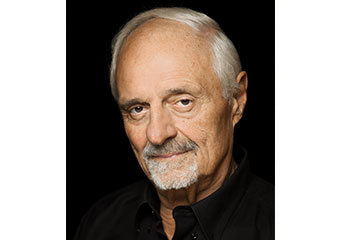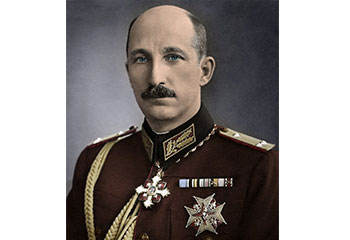Its working title is King’s Gambit, a fitting chess analogy – except that human lives, not wooden figures, were at stake.
Anyone familiar with the story of King Boris III, Bulgaria’s wartime monarch, has likely imagined it would make for a terrific Hollywood movie. After many hair-raising moves, Boris checkmated Adolf Hitler by rescuing all his country’s Jews during the Holocaust, earning an exalted place in Jewish history – despite a shadow over his legacy.
Using another image, Boris walked a tightrope, stalling, postponing and stonewalling Hitler repeatedly when it came to demands that Bulgaria’s Jews be deported to Nazi death camps.
“He was a wily old fox,” according to Canadian film and television director Ted Kotcheff. In fact, historians record that Hitler himself dubbed King Boris “the Fox.”
“It’s a great story,” Kotcheff told The CJN on the phone from his home in Beverly Hills, Calif., “because not one Bulgarian Jew died during World War II. In fact, the Bulgarian Jewish community was the only Jewish community in all of Europe that increased in numbers during the war.” Indeed, it went from 48,000 to 49,000.
Kotcheff has found the tale so irresistible that he’s planning a Hollywood treatment fit for a king. The Canadian director of such films as The Apprenticeship of Duddy Kravitz, Fun with Dick and Jane and Joshua Then and Now, and who was executive producer for a dozen years of the hit TV show Law & Order: Special Victims Unit, has written a script and is now raising money for the project.
“Every director I know has a film within them they always wanted to make,” Kotcheff said. For him, it was about King Boris. “If I don’t make it now, I’ll never make it,” the 86-year-old added with a chuckle.
He was a wily old fox. -Director Ted Kotcheff
It took him about six months to write the script. “It’s a story of great moral courage,” he said. “Boris knew this battle might cost him his life but he did it anyway. If more leaders had done it, hundreds of thousands of Jews could have been saved.
“Everybody I speak to in Hollywood is saying ‘Wow, what a great story. How come it’s never been publicized?’”
Initially neutral, Bulgaria joined the Axis in 1941 and instituted harsh anti-Jewish measures modelled on Nazi Germany’s Nuremberg Laws. For its loyalty, Germany awarded Bulgaria historic lands it had long claimed: western Thrace taken from Greece, and Macedonia from Yugoslavia. Boris became known as “the Unifier.”
READ: DANISH FILM INSPIRED BY TRUE EVENTS
Despite intense pressure from Hitler, with whom he had several meetings, Boris stuck to his “three noes”: No joining the war against the Soviet Union, no Nazi invasion of Bulgaria and no deportations of Jews, who were needed as labour, he insisted, to build roads and railways. Besides, he fudged, they were unlike other European Jews anyway, because they were “Spanish” (Sephardic). It was a dicey game of equivocation.
But in early 1943, Boris conceded to Nazi pressure to deport 20,000 Jews. The plan was to take as many as possible from Thrace and Macedonia, with the rest coming from within Bulgaria proper. An outcry from the public and from parliamentary and church leaders cancelled the deportations, but not before 11,343 Jews from Thrace and Macedonia were shipped to Treblinka and Auschwitz.
Kotcheff maintains that these regions were administered by the Germans, who rounded up the Jews, and that Boris had no control over their fate. However, historians dispute this, saying Thrace and Macedonia were under Bulgarian control.

Michael Bar-Zohar, author of Beyond Hitler’s Grasp: The Heroic Rescue of Bulgaria’s Jews, has said that Boris did not prevent the deportations, which were carried out by the Bulgarian army, because he did not regard the Jews of Thrace and Macedonia as Bulgarians.
On a state visit to Israel in 2008, then Bulgarian president Georgi Parvanov accepted responsibility on behalf of the country for the genocide of the Jews from these regions.
Notably, King Boris is not one of the 20 Bulgarians registered as Righteous Among the Nations at Yad Vashem.
Even so, the king “did his best,” Kotcheff noted, and remains a much-loved hero to millions.
Not to give too much away, but an especially dramatic part in the film takes place when Hitler becomes aware that Boris has outwitted him.
“You’re waiting for the moment Hitler realizes this so-called friend of his has been fooling him and pulling the wool over his eyes,” Kotcheff said. “It’s a very dramatic scene.”
Boris’ death in 1943 remains a mystery. Some believe Hitler had him poisoned. But Kotcheff claimed that the king’s wife, Queen Giovanna, felt Soviet leader Josef Stalin had him killed. “He had a motive,” Kotcheff said.
Kotcheff is looking to raise between $8 million and $10 million to make the film, and has already envisioned suave British actor Jude Law for the lead.
“The hard part is getting a good script,” he said. “I’m very happy with the script.”
Some errors crept into an earlier version of this story. According to Kotcheff’s brother, Tim, Ted Kotcheff was born William Theodore Kotcheff, not Velichko Todoroff Tsotcheff, as reported. Their father came to Canada in 1925, not 1927. Tim Kotcheff also disputes his brother’s memory that their father built a replica of his Bulgarian home in Toronto.









